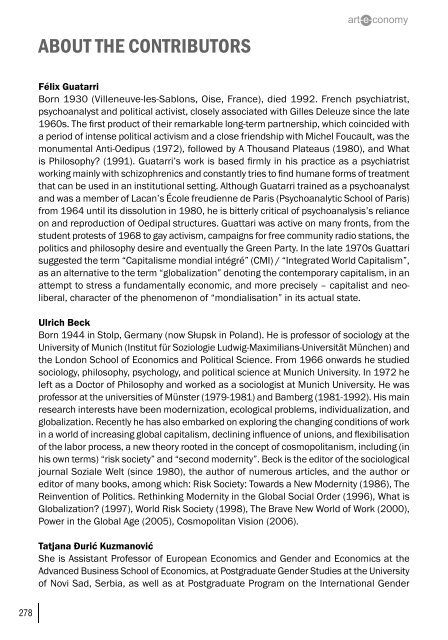art-e-conomy _ reader - marko stamenkovic
art-e-conomy _ reader - marko stamenkovic
art-e-conomy _ reader - marko stamenkovic
You also want an ePaper? Increase the reach of your titles
YUMPU automatically turns print PDFs into web optimized ePapers that Google loves.
278<br />
ABOUT THE CONTRIBUTORS<br />
Félix Guatarri<br />
Born 1930 (Villeneuve-les-Sablons, Oise, France), died 1992. French psychiatrist,<br />
psychoanalyst and political activist, closely associated with Gilles Deleuze since the late<br />
1960s. The first product of their remarkable long-term p<strong>art</strong>nership, which coincided with<br />
a period of intense political activism and a close friendship with Michel Foucault, was the<br />
monumental Anti-Oedipus (1972), followed by A Thousand Plateaus (1980), and What<br />
is Philosophy? (1991). Guatarri’s work is based firmly in his practice as a psychiatrist<br />
working mainly with schizophrenics and constantly tries to find humane forms of treatment<br />
that can be used in an institutional setting. Although Guatarri trained as a psychoanalyst<br />
and was a member of Lacan’s École freudienne de Paris (Psychoanalytic School of Paris)<br />
from 1964 until its dissolution in 1980, he is bitterly critical of psychoanalysis’s reliance<br />
on and reproduction of Oedipal structures. Guattari was active on many fronts, from the<br />
student protests of 1968 to gay activism, campaigns for free community radio stations, the<br />
politics and philosophy desire and eventually the Green P<strong>art</strong>y. In the late 1970s Guattari<br />
suggested the term “Capitalisme mondial intégré” (CMI) / “Integrated World Capitalism”,<br />
as an alternative to the term “globalization” denoting the contemporary capitalism, in an<br />
attempt to stress a fundamentally economic, and more precisely – capitalist and neoliberal,<br />
character of the phenomenon of “mondialisation” in its actual state.<br />
Ulrich Beck<br />
Born 1944 in Stolp, Germany (now Słupsk in Poland). He is professor of sociology at the<br />
University of Munich (Institut für Soziologie Ludwig-Maximilians-Universität München) and<br />
the London School of Economics and Political Science. From 1966 onwards he studied<br />
sociology, philosophy, psychology, and political science at Munich University. In 1972 he<br />
left as a Doctor of Philosophy and worked as a sociologist at Munich University. He was<br />
professor at the universities of Münster (1979-1981) and Bamberg (1981-1992). His main<br />
research interests have been modernization, ecological problems, individualization, and<br />
globalization. Recently he has also embarked on exploring the changing conditions of work<br />
in a world of increasing global capitalism, declining influence of unions, and flexibilisation<br />
of the labor process, a new theory rooted in the concept of cosmopolitanism, including (in<br />
his own terms) “risk society” and “second modernity”. Beck is the editor of the sociological<br />
journal Soziale Welt (since 1980), the author of numerous <strong>art</strong>icles, and the author or<br />
editor of many books, among which: Risk Society: Towards a New Modernity (1986), The<br />
Reinvention of Politics. Rethinking Modernity in the Global Social Order (1996), What is<br />
Globalization? (1997), World Risk Society (1998), The Brave New World of Work (2000),<br />
Power in the Global Age (2005), Cosmopolitan Vision (2006).<br />
Tatjana Đurić Kuzmanović<br />
She is Assistant Professor of European Economics and Gender and Economics at the<br />
Advanced Business School of Economics, at Postgraduate Gender Studies at the University<br />
of Novi Sad, Serbia, as well as at Postgraduate Program on the International Gender


